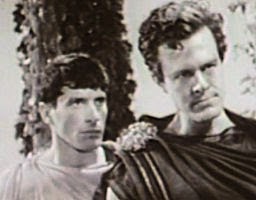Skip ahead a decade and my colleague retired. I inherited teaching the course (but as part of my regular teaching load).
As an undergrad, I'd been intimidated by higher math and by my mathlete friends who were fans of the philosophy department's logic courses. I avoided both disciplines as much as possible.
 |
| Walter Cronkite in '53 |
 |
| Cassavetes as Plato; Culp as Xenophon |
That's how shallow my understanding was. (Go ahead. Ask me if I get sidetracked sometimes.)
Luckily, my colleague left behind lots of great teaching ideas. I got interested. Since I couldn't ad lib about anything philosophical, I had to read a lot on my own and come up with teaching ideas too. And I think I created some good ones.
All that is prologue to reading Anthony Gottlieb's review of Rebecca Newberger Goldstein's book, Plato at the Googleplex, Why Philosophy Won't Go Away. A couple people later panned the review, but it persuaded me to buy (yes, buy) a copy of the book and dig into it. (That digging took awhile. That's why I haven't written anything here for six weeks.)
There are two kinds of chapters in the book. One set of chapters are essays on Platonic and Socratic ideas and the culture in which they were created. The one I latched on to best primarily addressed the question of why the 4th century BCE in Greece was different from the centuries that preceded it in other places. Other chapters describe the culture of Athens, explain Socrates' decision to die, and analyze Plato's famous cave.
Alternating with those chapters are episodes in which Plato appears in the present-day United States. He visits a philosophy class. He goes on a book tour to promote his work that includes a stop at the Googleplex, the corporate headquarters of Google, Inc. to discuss crowdsourced ethics, a debate at the 92nd Street Y about child rearing, a session with Dear Margo, helping her answer questions from readers, an interview with a dismissive, right-wing radio host, and a session with a neuroscientist and a cognitive scientist about free will. That debate ends as the scientists are about to observe the operation of Plato's brain using functional magnetic resonance imaging (fMRI).
In each of these chapters about the 2400-year-old philosopher visitng the USA, there's a dialogue. Maybe they're modeled on dialogues Plato wrote. (Someone more knowledgeable will have to tell us.) But for the first time I sort of understood what was being debated. I reveled in those chapters. In his review, Gottlieb suggested that the philosophical essays were more valuable and the imaginary dialogues could have been omitted. I think the opposite is true. I read the words of the essays, but I didn't struggle to understand them. I did concentrate on the dialogues. The book is over 400 pages. I'd be okay with losing the essays.
So now it's up to you to read Plato at the Googleplex (I think it's worth the time) and tell us what you thought of it. Write and tell this little bit of the world.
Or, if you've read something else you would like to recommend or advise avoiding, you can write too.
- Michale Dirda's review in the Washington Post.
- Colin McGinn's review in The Wall Street Journal
- David Auerbach's review at Slate.
- Rosecrans Baldwin's review at NPR.


No comments:
Post a Comment